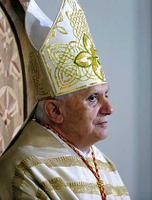
"We are all sinners." It's a Christian cliche that's worn to tatters. When it is proclaimed, eyes roll, shoulders shrug, and ears close. It's reflexively dismissed as religious gobblety-gook.
Yet understanding this fact is the essential first step toward reconciling with the Creator of your soul. In other words, you need to accept that you're at odds with your heavenly Father before you can begin your journey "home."
The proverb condemns the "adulteress" for her denial:
This is the way of an adulteress: she eats, and wipes her mouth, and says, "I have done no wrong" (Proverbs 30:20, RSV-CE).The imagery here is almost obscene if you let your mind wander, but it illustrates how there are some who, whether because of poor moral formation or force of habit, have no sense of remorse or even acknowledgement of their sins. You know people like that. Perhaps you feel you are a people like that sometimes.
Searing one's conscience is dangerous; it is evil. A person who persists in sin disposes himself toward eating, wiping his mouth, and saying, "I have done no wrong." This very denial of sin is flirting with true human evil.
Christian psychologist M. Scott Peck says that
it is necessary that we first draw the distinction between evil and ordinary sin. It is not their sins per se that characterize evil people, rather it is the subtlety and persistence and consistency of their sins. This is because the central defect of the evil is not the sin but the refusal to acknowledge it. (People of the Lie, p. 69; emphasis mine).The prodigal in Jesus' parable of the lost son (Luke 15:11-32), after disregarding his father's inheritance through wild and sinful living, was finally able to see himself for what he was: a sinner.
"Father," he said, "I have sinned against heaven and against you. I am no longer worthy to be called your son."
It was only after the prodigal was willing to be honest and confess his sinfulness that he could return home to the open arms of his father.
Our heavenly Father is always awaiting our return with open arms, for "[i]f we confess our sins, he is faithful and just, and will forgive our sins and cleanse us from all unrighteousness" (1 John 1:9).
Do you want to come "home"? Do you want to finally harmonize your life with God's will? Do you want to fulfill your incredible human potential?
Stop playing games, and admit your faults. Don't cover your sins -- that is God's job. And be willing to let God not only "blot your sins" from a legal record book, but cleanse you from the inside out.
It will cost you your pride, your passions, your wants, and your will. Maybe even your life. Confronting and confessing your sins will hurt, but if you can search your soul and find it within you to surrender your all to Him, God will heal you. He will welcome you home with open arms.






